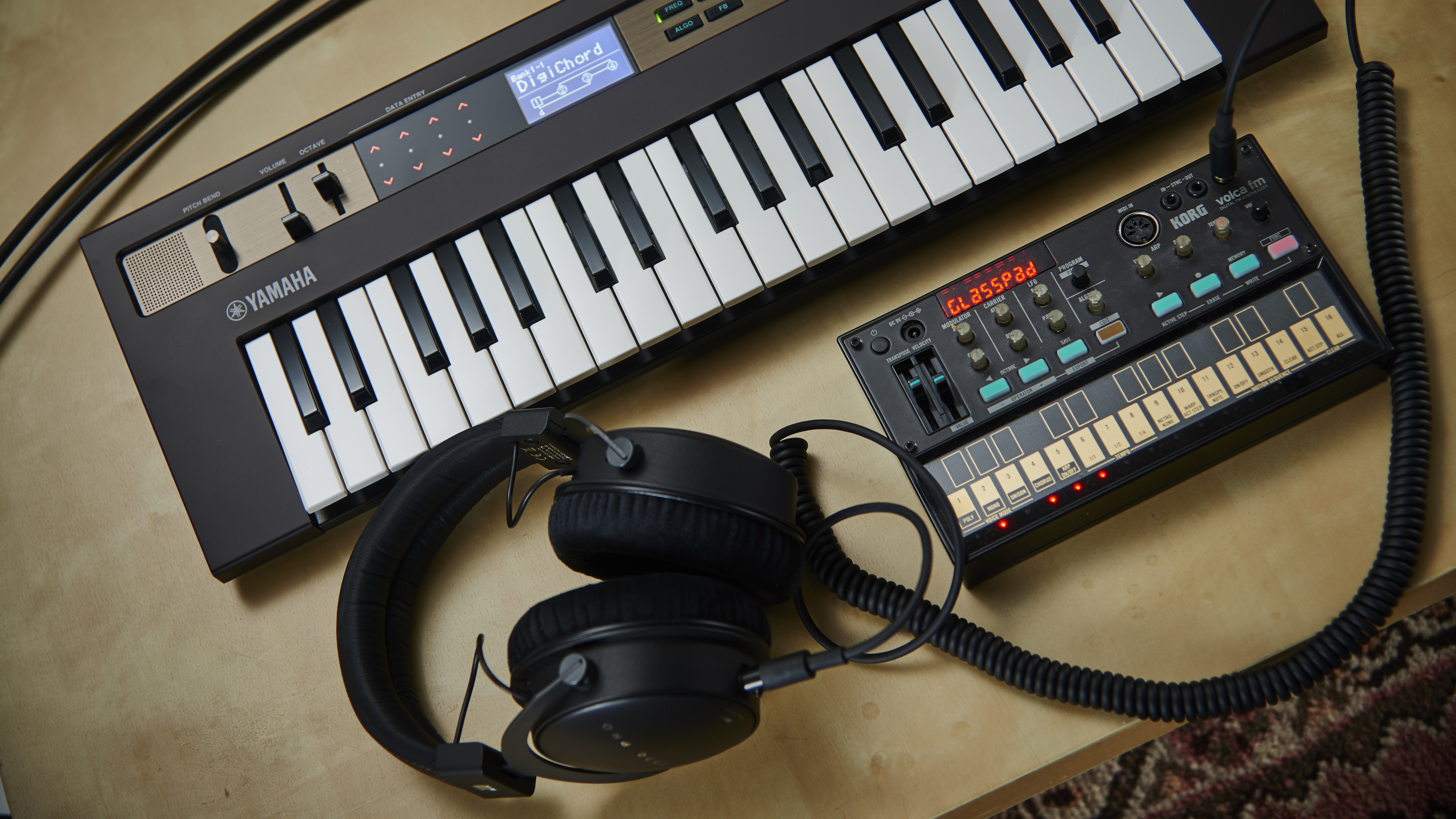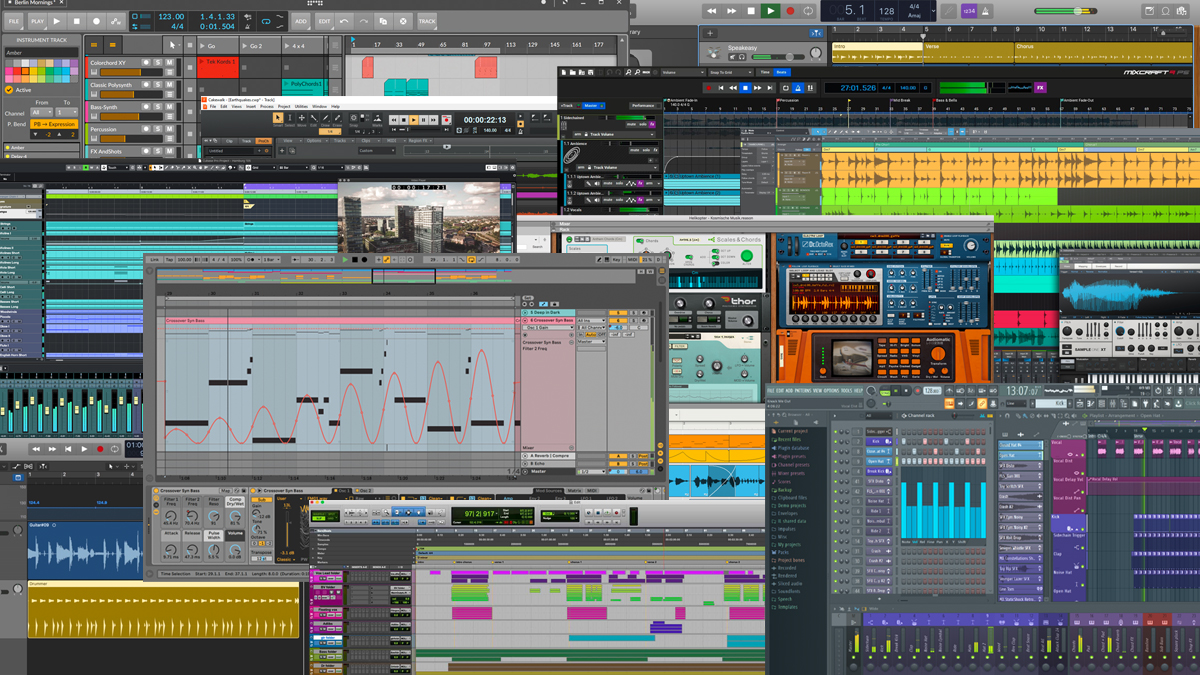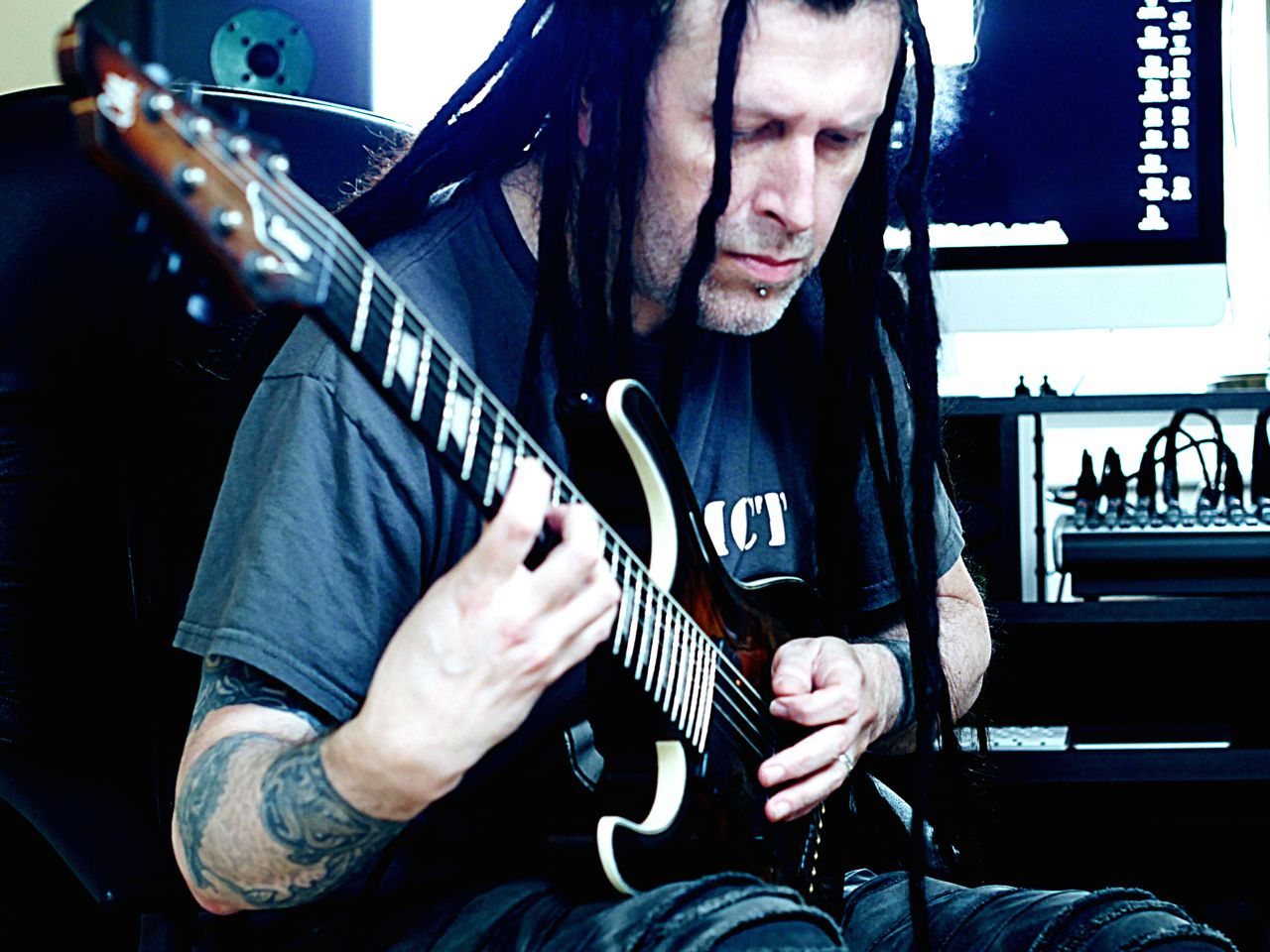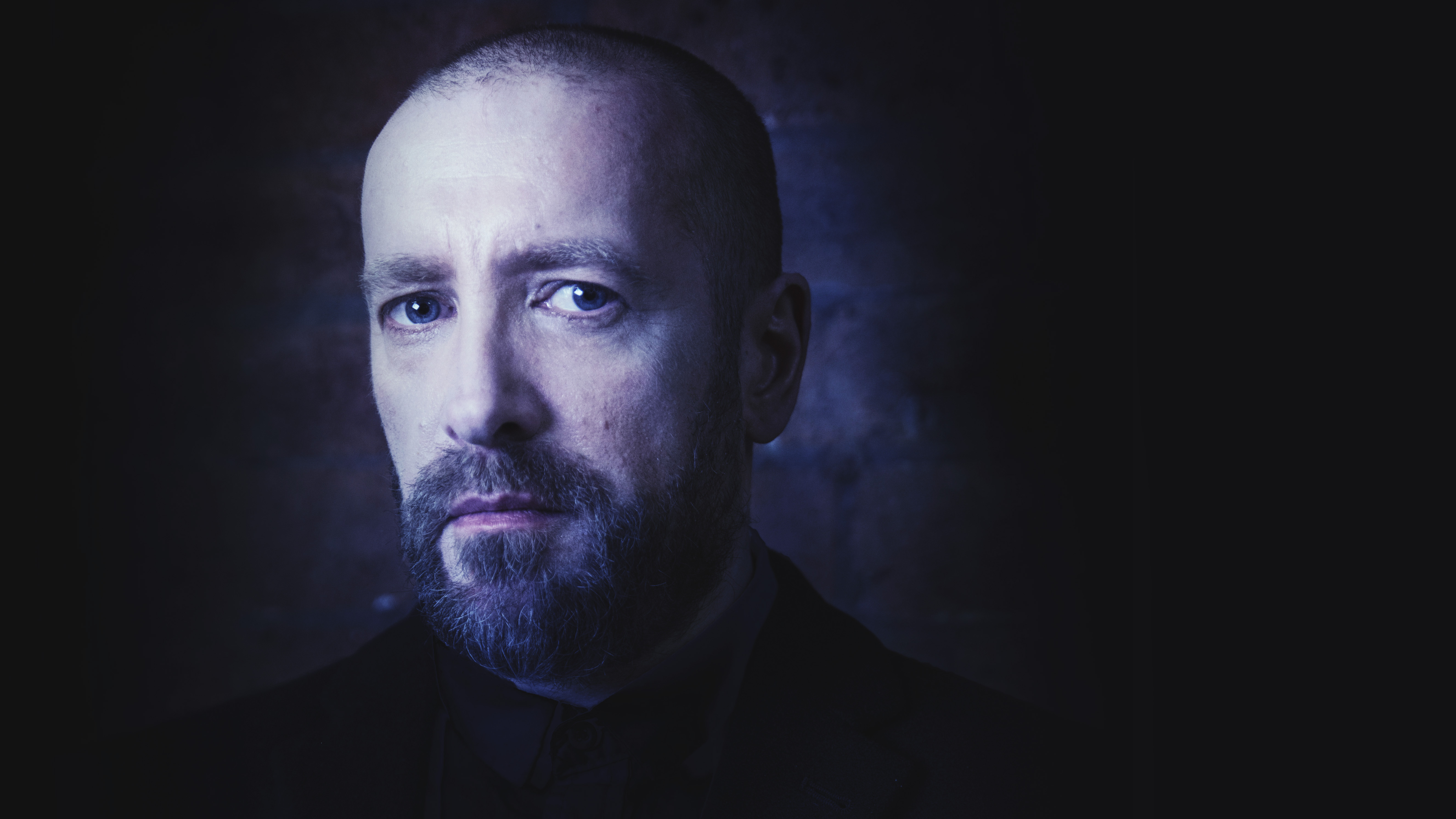
“The key with death metal singing is you’ve got to sing quietly" – Paradise Lost's Nick Holmes talks vocals and songwriting
by Rob Laing“The key with death metal singing is you’ve got to sing quietly" – Paradise Lost's Nick Holmes talks vocals and songwriting
Paradise Lost are one of the very best metal acts the UK has produced, with a 30-year discography that has moved through death and doom metal, to inventing the concept of gothic metal and surprising Depeche Mode-esque synth orchestration. Sometimes they manage to mix it all within single songs.
New album Obsidian proves the five-piece are showing no signs of lowering any of their high standards – and it's just gone into the UK album charts at number 32, their highest placing since the '90s.
Not that there's any laurel-resting on their side. The Yorkshire band simply get on with moving forwards, with a dry humour that's often overlooked.
“We started the band because we love music," vocalist Nick Holmes tells us from his home. "I read about an American artist once that he started a band to ‘get chicks and if a musician said they didn’t, they’re lying’.
"That’s bullshit, we did it because we liked death metal. If you’re passionate about something, really passionate, you can turn it into a career.
“It’s like Ricky Gervais said, he writes about what he knows. And he isn’t doing bad!”
Nick Holmes and guitarist Greg Mackintosh have been the central songwriting nucleus of Paradise Lost through their evolution. But while we've spoken to Greg about the creative process (who has also fronted Vallenfyre and now Strigoi), Nick's side of the songwriting and vocal story is rarely focussed on in detail.
So there's a lot ot talk about…
Paradise Lost are 16 albums in now, how do you feel about where you are as a vocalist?
“Voices change anyway, particularly when I listen to the very early stuff I could tell, even with the growling death metal voice, I still sound like a teenager growling. To me it sounds like a kid’s voice. It’s a lot different to how it is now. I couldn’t sing the same as that if I tried.
“I remember Bruce Dickinson saying that years and years ago, that your voice changes. And I didn’t really get what I meant. At that point he still sounded the same as he always did but now I think he sounds a lot different actually.
“I guess I’ve learned to stick to what I can do and don’t do what I can’t. In the old days when we wrote songs, we couldn’t demo them and we didn’t rehearse them much when we were writing.
"Greg would go home and do something, then I would do something. Even then I’d find melody lines that were pretty much out of my range. It’s a but daft and I wouldn’t rehearse it enough to see if I could pull it off or get used to it.
“There’s been some bits in songs where it’s so high it’s insane. Being able to sing like Geoff Tate would be fantastic!
“Everything now from my point of view is, can I do it live? It depends on the song – if it’s incredibly orchestral you know there’s so much you’ll have to put on [backing track] that it would sound too naff and we’d probably not do that anyway.
"There’s going to be some backing tracks for this new album, it’s inevitable really. Unless you’re playing in arenas with full arena rehearsals like the Metallicas of this world. If you’re playing some club in Bratislava to 200-300 people you plan accordingly.
“Writing-wise, particularly the last few albums we’ve gone into it asking, can I do this live every single night for six weeks? I think you’ve got to now.
"The live circuit has become more and more an integral part of being in a band, it’s always been important, but particularly since people stopped making money from albums. You’ve got to look other revenue streams and live music has become the main one for musicians.”
All your albums are distinct, do you go in to the writing process with an idea of the direction you want to go in?
“At the end of the last album it’s usually quite hard to get the ball rolling again and the first couple of songs are usually reminiscent of the album prior to it. In this case, the first song we wrote was Fall From Grace and it is a similar vein to the last album, it could fit on the last album.
“It’s kind of what Greg comes up with really, because sometimes he’ll write very traditional kind of riffs and then other times he’ll throw a curveball.
“One of the ways we write is quite strange. He will send me a riff or two riffs together and then I will just sing as many different singing lines I can think of; melody lines, gruff, clean, everything in between.
"The song One Second, for example, that’s pretty much the same riff all the way through and it’s all around the vocal line. If I can do more of that kind of thing to one easy riff, that’s even better.
"But usually I send him about six tracks of vocals with lyrics that are just bullshit to generate the melody lines. Then he goes away for two weeks and when he comes back nine times out of ten he’s written a full song with everything I’ve done but completely constructed around new riffs.”
That’s a really unusual way of writing!
“Yes it is. It’s very unorthodox but we started doing it a few years ago and the weird thing is, when you get the song back it’s your voice but you don’t even recall what you sang to because it’s completely changed. It’s very bizarre.
Greg Mackintosh interview
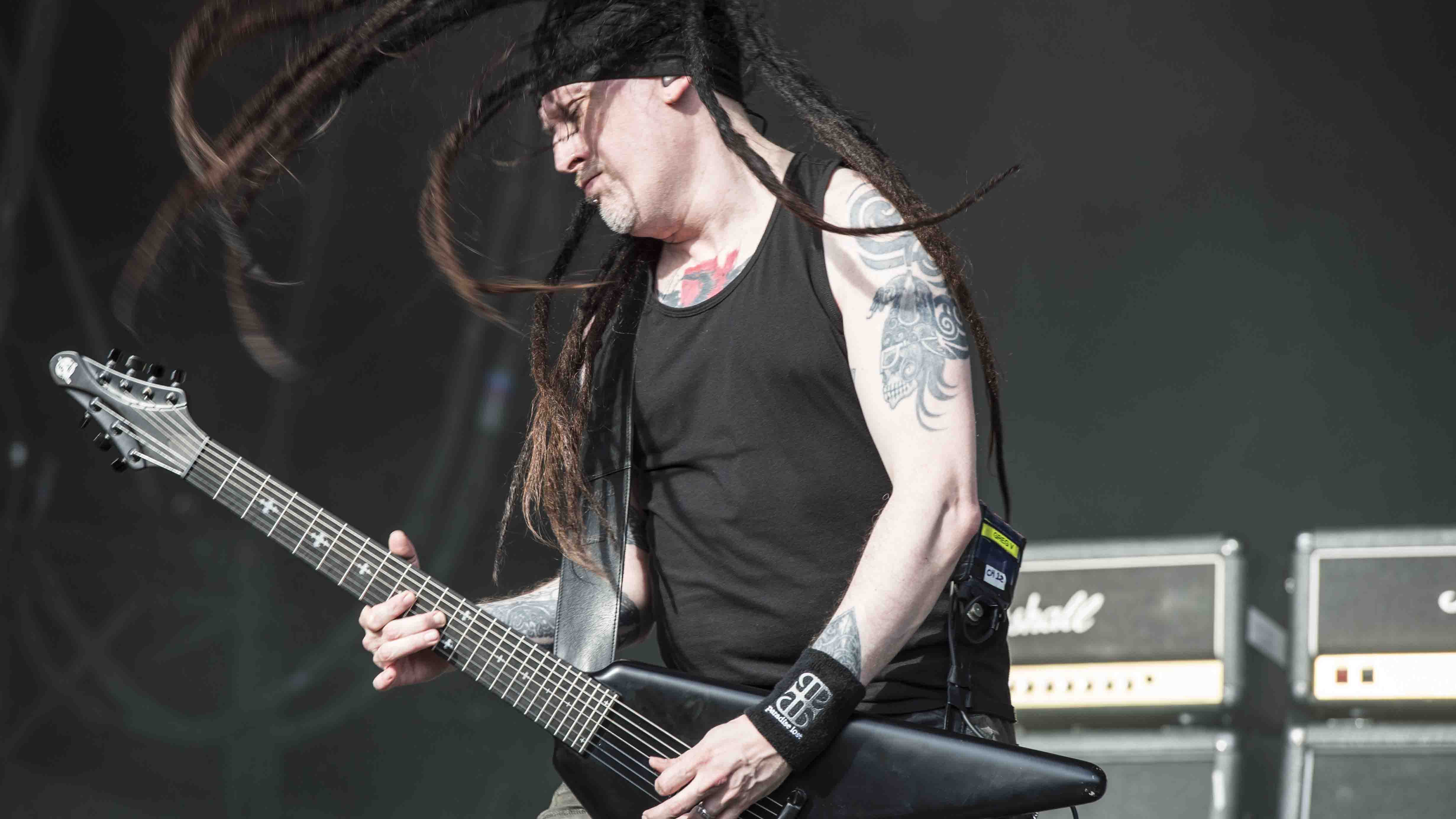
(Image credit: TRACEYWELCH/REX/Shutterstock)
“The first song on the album, Darker Thoughts, that was written in a traditional sense. Like I did with One Second. Then when the song kicks in it goes back to the jigsaw writing, as Greg calls it. I think it works really well with the heavy songs where there’s a lot of riffs welded together like old school metal bands used to do years ago. With the heavy songs it definitely works.
“For more melodic songs it’s nice if you can follow the pattern of something that’s pre-written and doesn’t change too much. With the gruff voice it’s almost like another instrument so you can chop and change it more than you can do with the cleaner voice.
“We started doing it about ten years ago and it doesn’t always work but it’s a pretty good way of writing. Greg loves doing it as well. When he gets in his studio you don’t hear from him for ages.”
How did you write together before that?
“We had a Fostex four-track recorder and I remember flicking the thing forwards and backwards, then we went to an eight-track Tascam D-88. I think we had a couple of those because we took them on tour for backing tracks.
“Greg would send us songs through, this was before the internet was everywhere. We’d have to put them on to hard drives. We’d use the very early Logic before it became Mac only. Before that there was the Fostex and before that I think we had a massive ghetto blaster I used to sing along to!”
So you just adapted to whatever technology there was at the time
“Greg got into the DAWs before I did, I had to follow suit. I’m really into computer technology but I was never into music software. And I’m still a little reserved with it. When people say, if you can't play it on a guitar there’s no point in playing it at all. I’m a little bit like that sometimes.
“I think if you’ve got too many tools to play with you can get lost in samples and I know some people can take ages to find their right sound, but I’ve never been interested in that. I like to write the song and come back to that after.
“I reluctantly got into the DAWs and I use PreSonus Studio One 4 that I absolutely love. I think Greg uses Logic, and I’m so used to it now I wouldn’t be without it.”
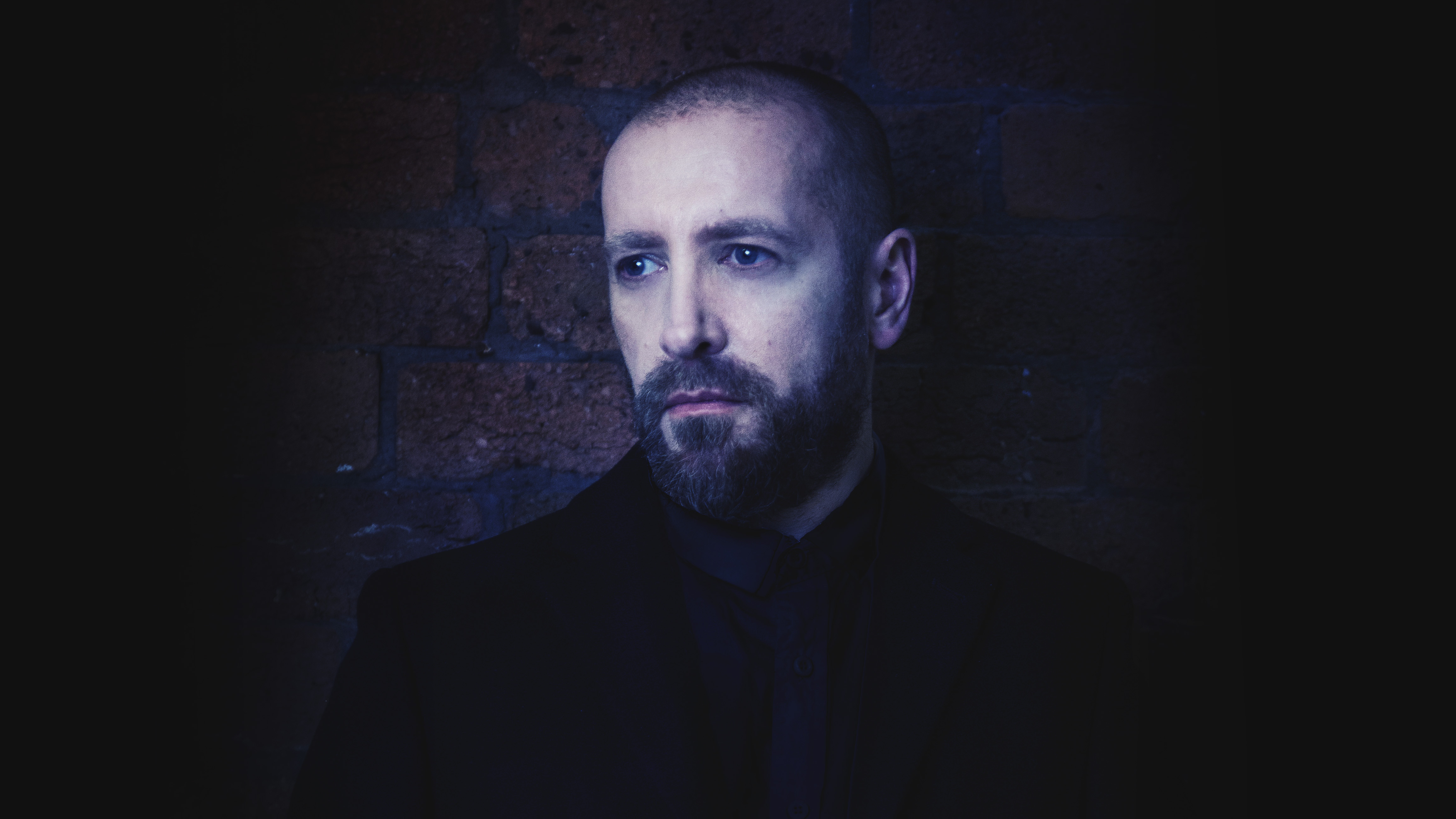
Have you got a songwriting space at home?
“I’ve had the whole cellar done out in the house so it’s my little space, it’s like a flat without a window! Hannibal Lecter’s cell with a computer in it!
"I think you need to have a room. When my children were little I’d run them to school or their auntie’s and I’d go down to our rehearsal room and that’s where I’d work on music all day. Then they got a little bit older and when you told them to go away then actually did go away, so I could use one of the rooms we had at the time.
Mic check
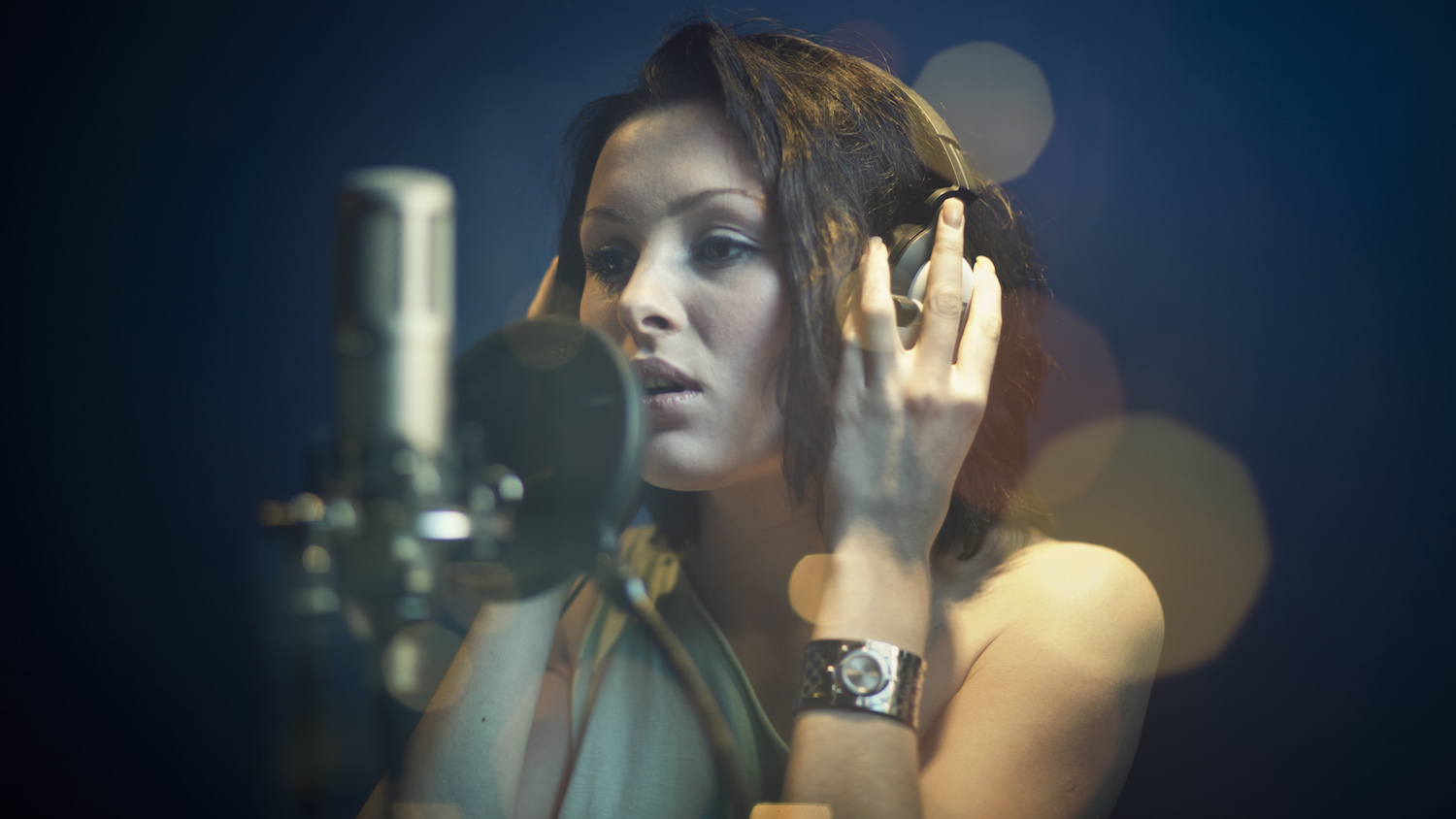
(Image credit: Getty/Simon Winnall)
Best vocal mics: recommended vocal microphones for the studio and stage
"With the last couple of places we’ve lived in I’ve always made sure I’ve got my own room for this kind of thing.
"And now where I am I can make as much noise as I want and no one hears it so it’s great. I have a little flashing light system at the top of the steps so if they want me they flash the light. So if I message my wife and ask here if she can make me a cup of tea, the little light goes on! I’m not doing anything, just playing video games all day [laughs]."
“You need somewhere with a bit of solitude. If I’m doing vocal takes with monitor headphones and they hear me crooning away, it sounds ridiculous without any music. Especially the gruff stuff – it sounds ridiculous without music. So it’s good to get your own private area.”
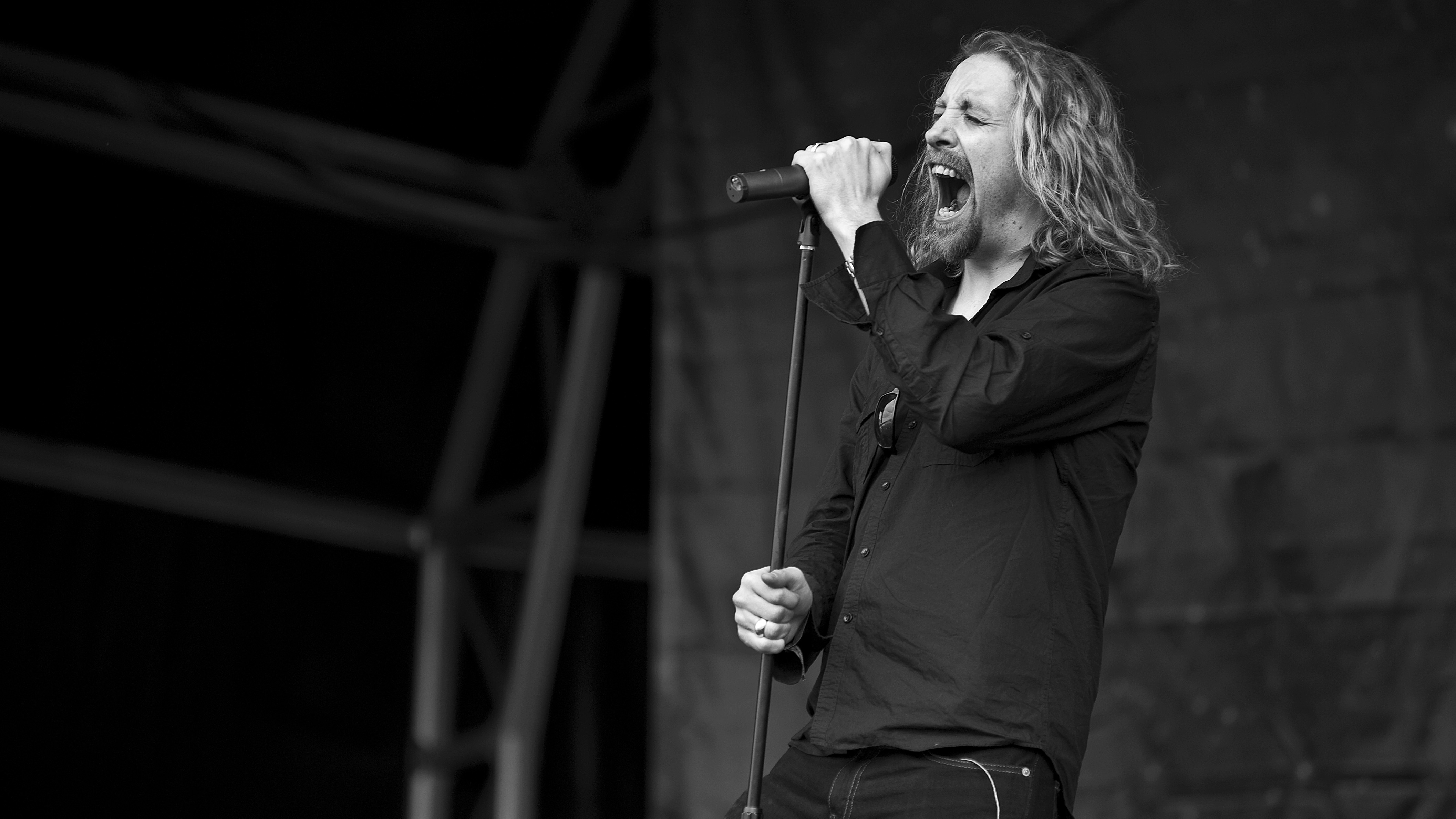
The Plague Within album [2015] saw the return of that death metal vocal style from you, what was the process like getting used to doing that again with your voice?
“We re-recorded a couple of tracks off our first album, I think we were using them as b-sides or extra songs a few years ago. I remember doing the gruff singing then and thinking, this is awful, this is like agony. I’m not sure if I can get back into this at all. Then I don’t know what it was, towards the end of the recording it just clicked – the technique of how I used to do it. I was fine.
“It’s funny because people try and do that voice and they rip their throats out. But there’s definitely a technique to it, but the longer you leave it, the worse it is when you start again. Singing in general is like that. When I haven’t sung for ages, I just sound like crap when I first start. You’ve obviously got to warm up your vocal chords.
“I think the key with death metal singing is you’ve got to sing quietly. Mike Åkerfeldt [Opeth and the original vocalist in Bloodbath who Nick also fronts now] is a really good death metal singer but he sings very quietly. He doesn’t belt it out. I’m trying to think of a death metal singer that belts it out and there’s not that many. Doing that night after night, you’ve got to be careful.
“If you’re shouting angrily, it’s far more damaging for your voice than any death metal concert. There’s no control when you shout and there’s way more damage. Going out to clubs or pubs when the music is loud and you’re talking over it to your friend, that’s the worst thing for a vocalist. I learned that quite a while ago. On tour I never go out. If it’s too loud I’ll walk out as well, I won’t go anywhere that’s loud.”
How do you preserve your voice on the road now? Do you still drink on tour?
“Yes but even then it’s not insane. Everybody drinks [in the band], it’s nice to have a little tipple at the end of the night but it’s not like you’re up until eight in the morning and you have a gig at four in the afternoon the next day. We’re all a little bit too old to be burning the candle at both ends.
"I think sleep is the best thing for the voice. You can’t beat a good night’s sleep – if you’ve got a bad throat it’s the best thing.”
You're mixing the extremes of your vocal styles more than ever before on Obsidian – is that a technical challenge in itself?
“It’s ok because everything you hear on the albums is within what I can do comfortably. The growling voice I find quite easy to do now, I’m comfortable with it. To go from that kind of voice to some of the things I do on Draconian Times, that’s a lot more shouty, a kind of gravelling high voice; that is really easy to knacker your voice with.
"That is way more shouty. For the last couple of albums I’m doing less and less of that voice.”
Is that what Greg calls your Hetfield voice?
“Yes, and the hand on the kettle voice – where you accidentally put your hand on the hot kettle!”
It’s kind of an angry singing – it sounds challenging
“You can control it when it’s not too high but when you go too high… we’ve got songs where they’re better for it on the albums, and the voice needed to be high. But I remember going into the studio and Simon Efemey was producing us at the time and he’d just be laughing at me at the time, trying to hit the note.
"I was going red in the face, almost crying and he was just laughing! Instead of saying, maybe we should bring it down a tone [laughs].
“This is before digital as well – we had to get it right. I remember trying to get the same note, that was clearly out of my range, for about 100 takes. Then you end up blowing your voice out and you have to have a day off.
"It’s funny now with younger bands, I wonder if they know what it used to be like prior to Pro Tools. It was a lot harder recording.”
In the early days of Paradise Lost you guys were listening to death and doom metal, but it’s almost like the evolution of the band tracks your open mindedness as listeners. Do you think it’s important for a songwriter to be open to new inspiration in that way?
“Yes, definitely. And I think think when you’re writing your own songs, you start taking influences from everywhere else anyway. It goes hand in hand with that. A lot of our peers have really changed their music style after originally starting out as death metal.
"As it is, death metal is a small umbrella. It’s very restricted with the growling vocals and extreme riffs, there’s not much manoeuvre for anything else outside that. If you suddenly put in a flamenco part they’d be like, ‘What the fuck is this?! This is insane!'
“Do if you're just doing that, album after album, for us it would get really boring. But as soon as we started the band we were death metal boys – absolutely obsessed with death metal. And pretty much after the first album we started to get into other stuff as well.
"I don’t think I started liking Aerosmith until I was about 24! I’d missed all these bands. I got to Whitesnake when I was 38 or something [laughs] I’d missed all these great bands because I was too busy listening to Sodom!
“Weirdly enough, it does go round again and you start getting into the death metal again. We did that really.”
Looking back, what albums did you and and Greg experiment most on in terms of your writing process?
“The obvious one would be the Host album. One Second hinted at Host and then Host went fully… there’s guitars on there but it’s not a metal album. Songwriting-wise I think some of the strongest songs we’ve ever written are on that record. Even when I hear it now I think it’s a great record.
"It’s very much the kind of music I would listen to. I like heavy stuff as well but if I was drinking alone or something, I would put that on because it’s a very dark album and up my street musically.
“At the time and the climate, in hindsight I always say maybe we should have released it as a side project or something. It wasn’t that long ago before it that we did Draconian Times which is completely different. I can understand why there was a few raised eyebrows.
“I certainly don’t regret it but in terms of songwriting, we learned so much. With song structures and those thing are still with us. Even song formulas, we got used to doing song formulas so it could get on MTV so it had a bridge, chorus and middle eight.
"Then years ago we said, 'Can we try to not do a song with this bloody format?' We got really sick of it. Now we don’t even think about that. So therefore we don’t even think about singles either, we just write albums.”
Sonically, Host had a different emphasis too
“Greg was really experimenting with keyboards and electronic side. He got really into that, he doesn’t do things by halves.
"I was always into the vibe of songs like that. But we always loved that you could get some real sadness with music when you hear violins, but with guitars it’s very much meat and vedg that you hear.
"With violins it’s very soulful, a lot sadder and I like the darkness you can get when it’s purely orchestrated. That’s what I love about that era of the band; very sad, dark songs.”
Yourself and Greg are the songwriting core of the band, but how do you make Aaron and Steve invested in the creative songwriting side? Will you share demos with them early on?
“Yes, so everyone is on the same hymn sheet, pretty much the first couple of songs. We’ll send them over and they’ll learn them and if there’s any discrepancy like, what’s this note?
"Then there will be different breakdowns for different people, Steve gets what he needs to hear on the track and Aaron will too so he can learn his parts. By the time we get into the studio everyone has completely nailed it. It’s not a case of getting things right because as soon as we’re in there, we know it, record it and get out.
“Our studio time is sort of sterile because we go in separately and record at different times. We have a WhatsApp group and we might see each other if someone’s stay overlaps by a day or something.”
And that works because you’ve agreed on the songs before going in
“Yes, and when you’re in the studio it’s more about sounds. It takes about a week for the drums and most of that is tuning the drums and getting them exactly right.”
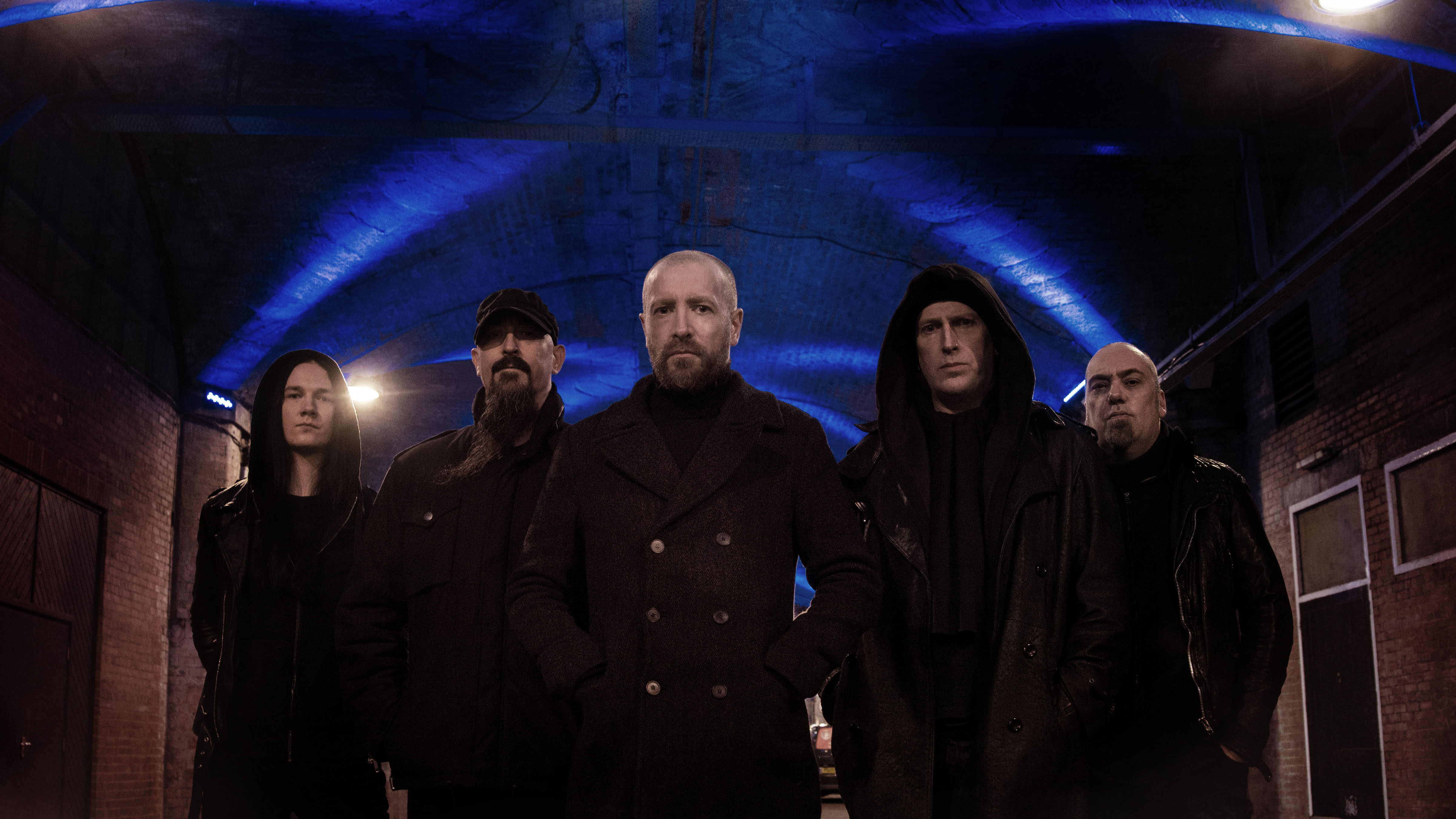
Have you ever written in the studio in the past?
“Maybe but it’s not nice, it could go either way when you’re doing it on the fly. You hear about the song Paranoid what was written in the studio but that was lucky, it could have gone either way. There’s probably a lot of Paranoids that didn’t work!
“I like to be organised. We might have done a couple of songs like that but it would have been before using DAWs and digital so we couldn’t see what the end result would be.
When we’ve done a full album we never seem to have enough tracks [left for bonus songs] so we’ve always done cover versions and decide on them while we’re in the studio in the last few days. We have done that a few times, which is scary but at least the song is already written.”
Your cover choices are always interesting – and often quite unexpected. Do you first envision in your mind whether there’s something you can bring to it?
“If it’s in a minor key there’s a good chance we’re going to pull it off than if it isn’t, put it that way. I think the one that was scariest was the Everything But The Girl one [Missing].
"That really was last minute. I think we were with Rhys Fulber when we did that one and he was already a bit of a peer, a real keyboardist; a pianist. It’s all very orchestrated on that one.”
That was during the In Requiem album sessions?
“Yes, he could already play keyboards so that was a big advantage for us to bring that one out. That was the one where it was, “Shit! What are we gonna do?! Oh, hang out I quite like this one…”
Has Greg ever brought you an idea for a song that he really loves and you either didn’t like it or just come up with anything?
“Yes, all the time and vice versa. In fact it’s more vice versa – he usually hates the stuff I do!”
How do you handle that?
“It depends, because if I write something and I think, I really like that and I think I’m onto something here, I’ll leave it and I’ll listen to it the next day. If I still think it’s good then it probably is. But I’ll make sure I leave it another day, then I’ll listen to it again. And if on the third day I still like it, I’ll e-mail it to him.
“And he usually gets back straight away if he likes it. If he doesn’t get back straight away… but if he doesn’t like it you’ve just got to drop it.
"If you don’t agree on something, there’s no point sticking to your guns. Then sometimes he says, 'Oh it’s a bit shit' and I’ll say, 'You know what? You’re right.' The penny drops.”
Is there possible material being stockpiled for a solo album then?
“We had a lot of downtime once and I wrote some songs that I’ve still got but because I don’t play guitar, I did them all with guitar plugins on a keyboard. Shreddage it’s called. I was doing riffs with the keyboard but it actually sounds alright. It’s actually not that bad. So I wrote four songs on that that I’ve had for about 15 years so watch this space! [laughs]”
So when you’re working on musical ideas at home, you're working with a DAW and midi keyboard?
“Yes, I can’t play keyboard but I use it for notes and if a choir is required in certain areas or violin works. I’ve got an old knackered SM58 which I use too.”
What’s the most important piece of equipment you own as a songwriter?
“If I was one of these air raid siren vocalists I’d probably say my voice! I’ve got an SM58 microphone, I could have picked a more impressive one…”
That’s the old classic though
“I’ve must have about five of them and I don’t know where any of them have come from. At home, the most important thing is probably the foam microphone cover because I’m paranoid about smashing my teeth!”
Songwriting partnerships really thrive on the dynamic between exchanging ideas, do you still have the same sense of excitement when you get an idea from Greg for a song?
“Yes, totally. I think the song Darker Thoughts was the last song we wrote for the album and originally that was just going to be an intro, not a song. It was going to be the intro and then it was going to go into the first song.
"But I sang the melody line over it and I actually sent that [back to Greg] straight away, I was that confident about it. This is going to work.
“He felt the same way and expanded on it. And it is what it is now. That was a very impulsive song and from the word go we loved it. But then there’s other songs where it takes time for us both to see the bigger picture with it.
“There's no rules to writing – you just plough through. There’s days when you’re pissed off, days when you’re creative and days when you can’t do anything. It’s like any sort of creative process.”
That’s an important point, because even if a songwriting partnership has a bad day it doesn’t necessarily mean their creative process doesn’t work, it’s just a bump in the road
“Yes, and sometimes I’ve worked on music and said, 'I can’t do anything with that, I’ve tried my best. If you’ve got anything in mind shout something into a mic.'
That’s happened quite a few times as well. Then if [Greg] hasn’t got anything he can think of, we usually just put the riff back on the shelf.
“There’s plenty of riffs on the shelf. We trim the fat off songs – we write the songs we need to write for the album and everything else just gets thrown away.”
You often have strong songs as bonus tracks with your albums – would you say you’re from that old school b-side mentality where it has to be a high standard?
“Definitely but now we don’t think about b-sides at all. The extra tracks for this album, particularly the song Hear The Night, that’s still one of my favourite songs on the album. That’s a really good song and that could have easily gone on the album, but we felt we had enough of that kind of song so we just wanted to mix up the album more.
“The song after that, Defiler, that’s a very strange kind of riff and the chorus is kind of cool as well. I always remembered getting Nirvana and Soundgarden b-sides.
"We ‘ve done shit ones as well but when you get a good b-side it’s more to listen to, it’s not something the band couldn’t be bothered with. Especially now, we really try to record an album and then decide right at the end what we’re not going to put on it.”
“If you’re thinking you’re writing a b-side, already the quality has gone down a bit. Psychologically if you think it’s only a b-side, you will not put as much effort into it. That’s why we like to do a lot of covers [as extra tracks], because at least you’re going to get a good song.”
You mentioned the way Darker Thoughts came together, do you and Greg write together in the same room much and does that bring out a different dynamic?
“We did it once because our management had this romantic view of us sitting in a wooden shack in the snow penning songs together like something out of a film. And I went to Greg’s house for the week and we just got pissed!
"The stuff that we did do, that night we were saying “this is fucking great” and then we went out to the pub, got up in the morning and played it back. It was just rubbish.
"So that was a complete waste of time. We’ve never done it since then and that was 20 years ago!”
That’s a good point though because there might be this idea for some musicians, maybe not with the current generation, that you need to be physically in the same room to write songs with other people
“With songwriting you’ve got to live with things; listen to it at different times of the day, when you’re tired and when you’re not tired, when you're happy, when you’re sad. If it sounds good in every aspect of that then it’s probably good.
"But if it’s just good because you’re half pissed then that isn’t good enough. Everything sounds better when you’re drunk.”
Recording tips
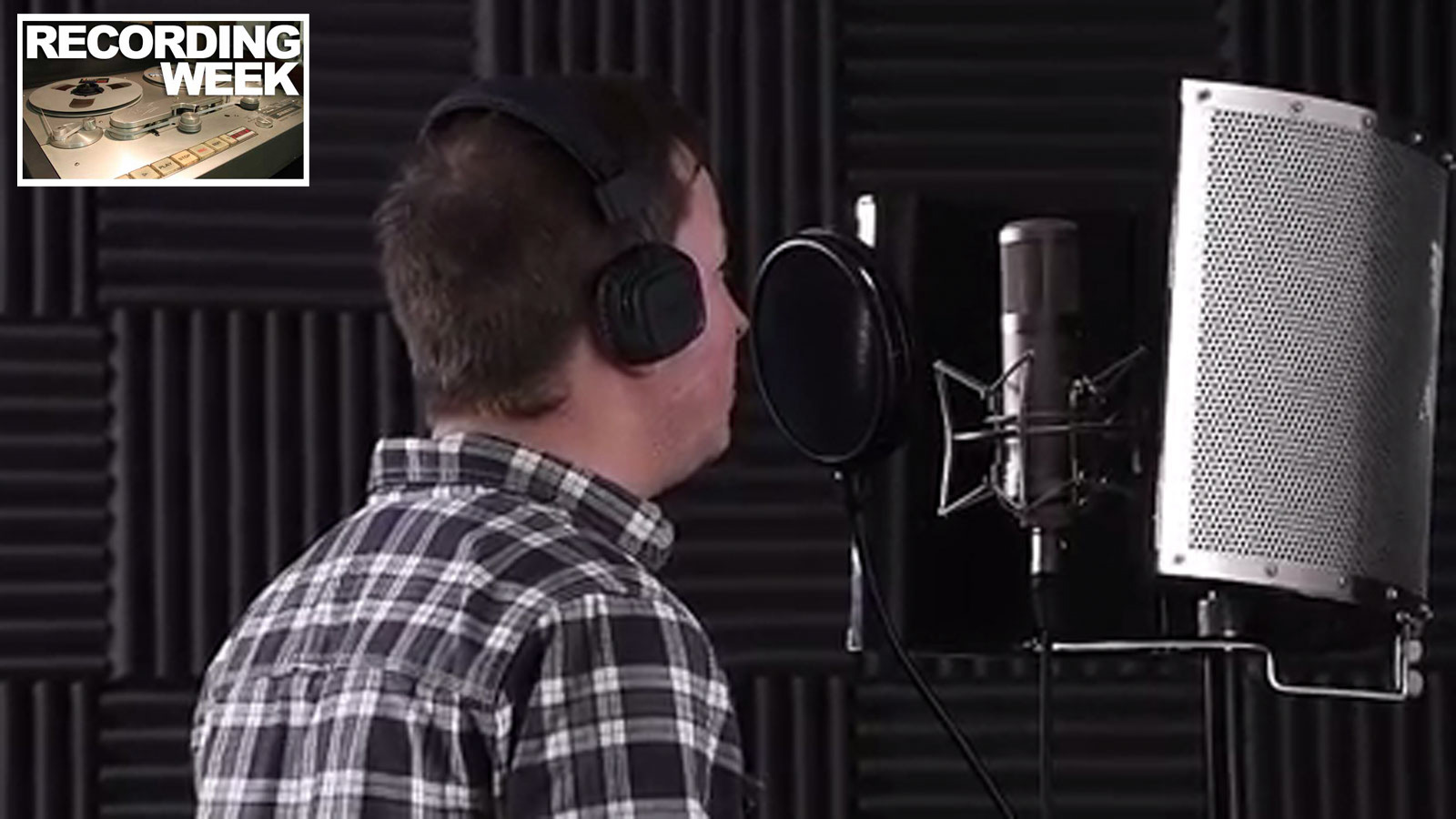
(Image credit: Future)
Follow these three steps to get a good vocal recording every time
Paul McCartney once said something about not recording your song ideas and if a melody is good enough you’ll remember it, what’s your take on that?
“I know what he means. I used to hum things into my phone and we used to have little dictaphones before phones – before phones! Imagine that! We bought them in Japan. They were £24 each but our manager still goes on about how expensive they were at the time!
“If I hear something when I’m out and think that would make a good melody line, I’ll just hum it into my phone. So yes, I know what he means but after all these albums, I have to get it down.”
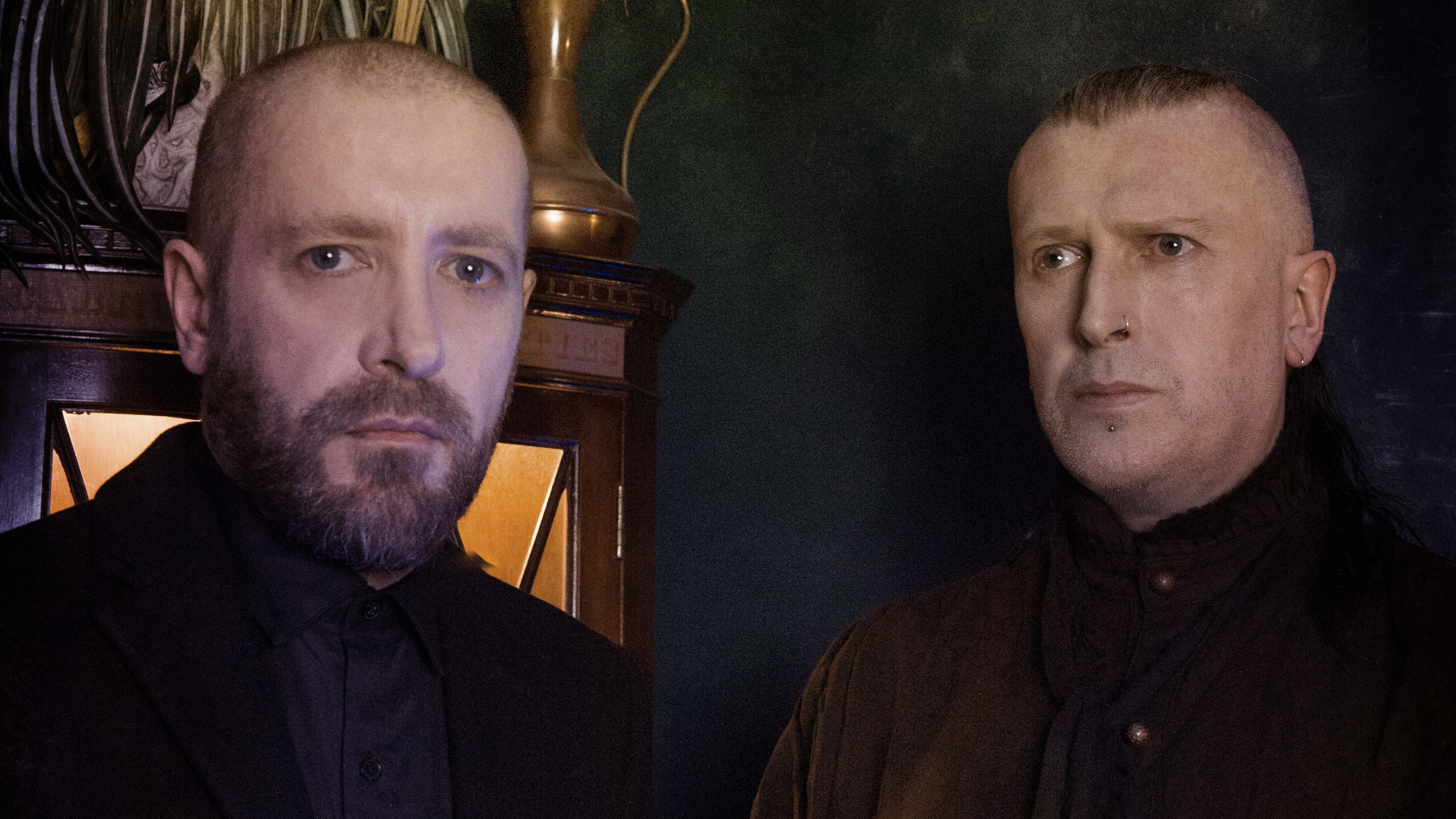
And in metal, some of the more interesting melodic ideas can take longer to sink in
“Yes, the best albums are usually the ones that take you four of five spins to get into. I remember when I got Master Of Puppets I didn’t like it at all. And then it sank in and it was incredible. But for the first two listens of it I was like, ‘What the fuck is this?!’ I just thought, what had they done, after Ride The Lightning.
“I got the original version that was just one LP, and it was very quiet because it was a long album. Then they brought out the double version. But I think the stuff that takes more time to kick in is better value for money.”
Do you think the old school Metallica approach in metal songwriting of writing parts and then making them work together made for stronger compositions? Where each part is under a microscope before it becomes part of a bigger picture
“How do Metallica even do it these days? I think you can have too long, you need to give yourself deadlines. How long do you need? Seven years? If you’re a graphic designer you have incredibly tight deadlines, you’re still expected to do decent work.
“You can be very productive when you’ve got deadlines as well, but not to the point where you’re writing in the studio. If you know you’ve got a year then you work towards that, if we were able to release it whenever we wanted, I don’t think that would be productive, personally.”
What about your lyrical inspirations, it always seems as if you’re studying human nature and looking outwards
“In the last five or six years I’ve got more into current events, it's probably something that comes with age because I was never that massively into things like that before. Even though I was obviously affected by it.
"I look at things in life but I get three years older with every album release so I’m looking at things in different ways. Every three years is a new perspective.
“Also, seeing my children grow up. They’re adults now so it’s seeing how life affects them. They’ve never not had the internet which is a bizarre concept. If you say to someone that life was better before the internet, they’d just think you’re an idiot. Even saying it puts you in that dad category, you can’t even say it.
“I’m looking at what they’ve got to face. And it’s so easy to fuck your life up now, especially online. You say something drunk on a message board and before you know it… it’s scary online.
"People are more together now with the internet and it’s a real tool but it can also be a nightmare with the 24 hour bullying people some people might have to put up with.
“Like you say, human nature [is an inspiration] and the pros and cons of being a human, I guess.”
Do you think part of songwriting is being an observer in that sense?
“Yes, religion still fascinates me. It’s fascinated me all my life. I’ve got quite a few friends who I’d say are devout Christians and we don’t need to talk about religion. They’re really nice people and it’s their thing, it makes them happy and that’s fine. But I still don’t understand why they think there’s something in the sky.
“There’s plenty to write about. Ultimately, the singing and the lyrics have got to fit with the music, it’s about the full picture. I want the lyrics to suit the music.”
There’s a sense that you’ve always followed your instincts as a band, would you say that for songwriters, looking to appeal to trends is not the best long term approach?
“I would definitely, but at the same time you’re lucky if you get that. Even with the Host stuff, it was all off our own backs – we were never told to do that. If we were doing something that we felt was to please someone else it would be ridiculous. It wouldn’t feel right at all."
There’s these great levellers now too with platforms like Bandcamp where you’re funding an artist on a more direct level than the traditional industry model
“We’ve been going for so long now it’s weird to imagine starting now. You’ve got to be accountant, a TV host… all these things now. When we started, all you had to do was go onstage and write songs. There was no other requirement.
“I see it with young bands; they don’t drink, they’re very professional. But you’ve to be now – you’ve got to be really on your game. You’ve got to be enthusiastic.
"That’s the climate now. If we started now, as we were when we were kids, we’d be gone in a second. But the luck involved in it is insane – there’s so much luck.”
More Paradise Lost
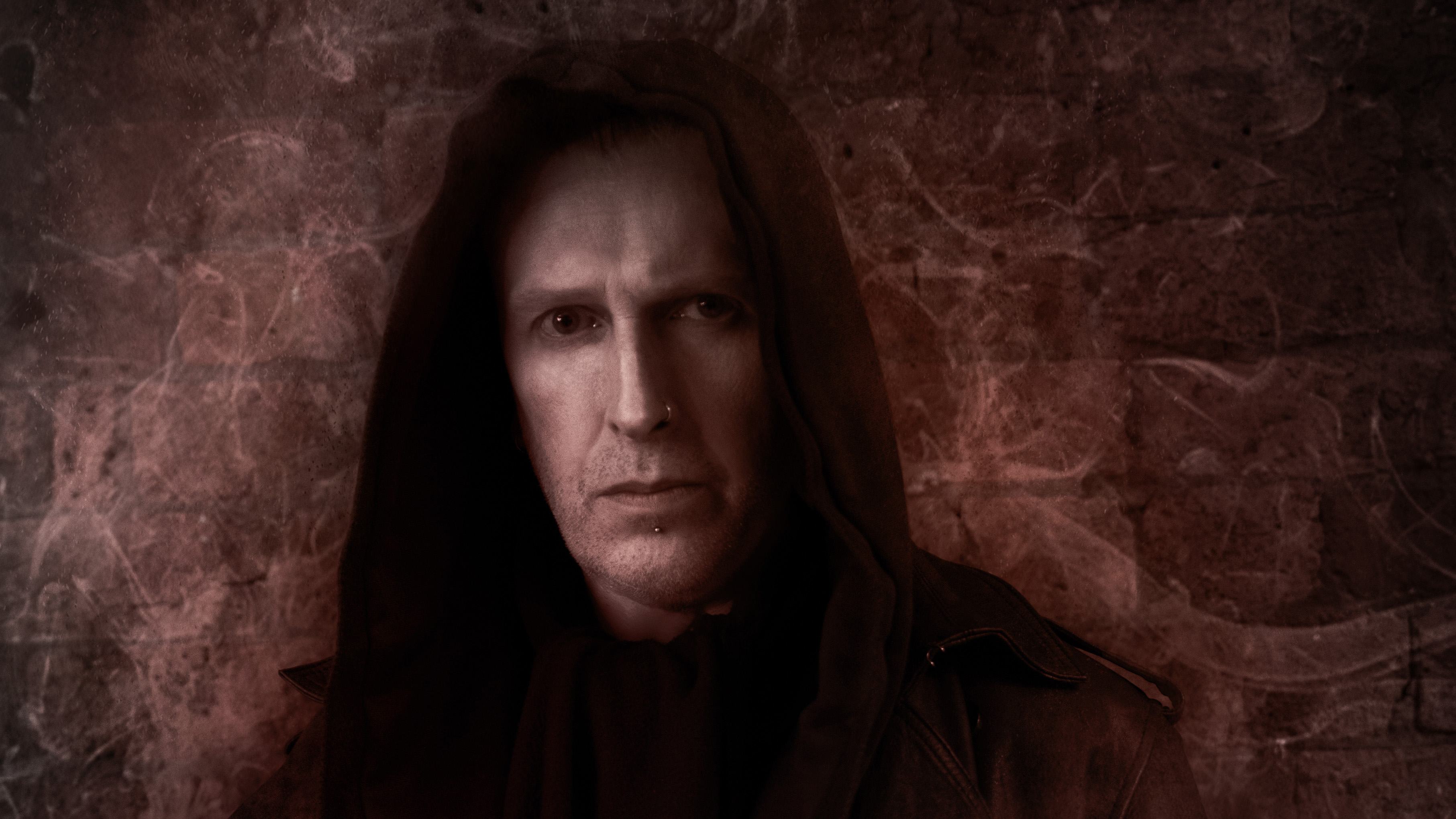
(Image credit: Paradise Lost )
Paradise Lost guitarist Greg Mackintosh: My 8 favourite goth albums
Finally, for musicians writing at home right now, what would your advice be?
“Use the technology out there to do it. There’s more bands out there as a result of it – there’s so many good plugins and it’s cheap as well now.
"When we started the band you had to buy instruments and the only people that had any money were the drummers because the drummers obviously had rich parents or they wouldn’t have a drum kit otherwise. Anyone who had a kit had a really nice house!
"Now you don’t need a lot of money. You can get yourself a studio setup cheaply. There’s great tutorials on YouTube. It’s easier than ever to make music – everything is there. You could spend a fortune if you want, but you really don’t need to.”
Paradise Lost's new album Obsidian is out now on Nuclear Blast records. For more info on the band, head over to paradiselost.co.uk
